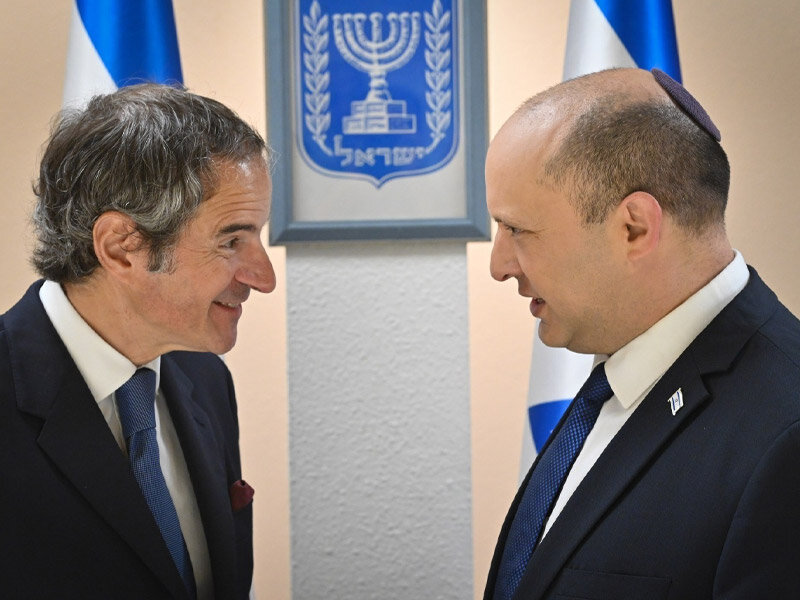Rafael Grossi’s role in provoking war on Iran
A diplomatic failure with catastrophic consequences

TEHRAN – The recent attacks on Iran’s peaceful nuclear facilities have raised serious questions about the role of international oversight institutions in escalating tensions—especially when their neutrality is seen to have diminished over time.
At the heart of the growing controversy is Rafael Grossi, Director-General of the International Atomic Energy Agency (IAEA). His handling of Iran’s nuclear file has drawn sharp criticism from Iranian officials and sparked broader debate among analysts about the risks of politicized reporting in already unstable environments.
Tensions between Tehran and the IAEA have been simmering for years, but recent developments have brought them to a head. In the days leading up to the first wave of Israeli strikes on Iran, a report from the Agency citing uranium enrichment levels in Iran “higher than those in countries without military nuclear programs” was widely referenced as justification by the Israeli regime. The timing of the report, its tone, and the broader diplomatic context have since come under scrutiny.
While Grossi later clarified in an interview with CNN that the IAEA had found no evidence of a “systematic effort” by Iran to build nuclear weapons, this admission came days after the damage had been done. The report had already been cited in support of a resolution drafted by the E3 and the U.S. at the IAEA Board of Governors—one that accused Iran of non-compliance and arguably laid the groundwork, diplomatically speaking, for what unfolded soon after.
Iranian officials view this sequence of events not as coincidence but as consequence. Amir Saeid Iravani, Iran’s ambassador to the United Nations, addressed a letter to the UN Security Council strongly objecting to the “selective, politicized, and discriminatory” conduct of the IAEA leadership toward Iran’s peaceful nuclear program. The letter emphasized the consistent departure from the agency’s foundational principles: neutrality, professionalism, and objectivity.
Iranian Foreign Ministry spokesman Esmaeil Baghaei posted on social media last Thursday, directly addressing Grossi’s comments. He noted that Grossi had acknowledged the absence of evidence too late—after a resolution had been drafted and an attack carried out. “You obscured this truth in your absolutely biased report,” Baghaei wrote, “which was then utilized by a genocidal warmongering regime to wage a war of aggression on Iran.”
The controversy has also drawn attention to a broader, more systemic issue: the vulnerability of international institutions to the political agendas of powerful states. For Iran, this is not the first time the IAEA has been accused of overstepping its mandate. But in the current context, the stakes appear higher than ever.
Earlier on this month, the Tehran Times revealed that Iran has uncovered sensitive IAEA-related documents in the occupied territories—documents that include confidential communications between Tehran and the Agency.
According to Tehran Times sources, these documents may not have been obtained through espionage but handed over through less clandestine means. As one source said: “this would only confirm what we’ve long suspected—that the IAEA is not merely a technical body, but a political instrument in certain hands.”
The implications of such a breach are far-reaching. Iran has already hinted that it may scale back cooperation with the Agency, possibly reverting to pre-JCPOA levels of engagement. The Atomic Energy Organization of Iran (AEOI) warned that continued politicization and lack of gratitude for Iran’s transparency could result in a shift in policy.
Meanwhile, Grossi has urged all sides to show restraint and return to the negotiating table. He emphasized that Iran is still expected to notify the Agency of any transfers of nuclear material between facilities, and admitted that the full extent of the damage to the Fordow enrichment site—hit during the Israeli strikes—remains unknown.
Yet Iranian officials remain deeply dissatisfied. Mohammad Eslami, head of the AEOI, has criticized Grossi for what he called “silence” in the face of Israeli attacks on nuclear facilities operating under IAEA safeguards. He also suggested that Tehran may pursue legal avenues against the IAEA chief, accusing him of failing to uphold the agency’s obligations.
Former Foreign Minister Mohammad Javad Zarif has taken an even firmer stance, calling for Grossi’s dismissal. In Zarif’s view, the Director-General’s “irresponsible and fallacious” reporting has not merely failed to deter conflict—it may have helped pave the way for it.
Following the airstrike on facilities in Arak, Iran sent a formal letter to the IAEA demanding that it condemn Israel’s actions. The agency’s lack of response only deepened Tehran’s sense of betrayal. Officials pointed out that, despite informing the IAEA of protective measures taken to safeguard nuclear equipment, Iran received no public support. Instead, they argue, IAEA reports amplified doubts rather than acknowledged Iran’s compliance.
This sense of disillusionment has added to concerns over the IAEA’s credibility at a global level. In Tehran, many now believe that transparency with the Agency has only made Iran more vulnerable. The principle of neutrality, they argue, is not being applied equally, and when impartial oversight becomes a political weapon, it undermines the very framework meant to ensure peace and security.
For now, the consequences—diplomatic, operational, and humanitarian—are already being felt and Rafael Grossi is now perceived as a figure whose conduct has actively contributed to the escalation of tensions. His selective silence on Israeli attacks, the timing and framing of Agency reports, and his ambiguous public statements have lent political cover to those seeking confrontation rather than dialogue. Iran has already said it will seek legal redress, as a message that neutrality must not be sacrificed without consequences. Grossi has crossed a line—one that may redefine how Tehran engages with the Agency going forward.
Leave a Comment